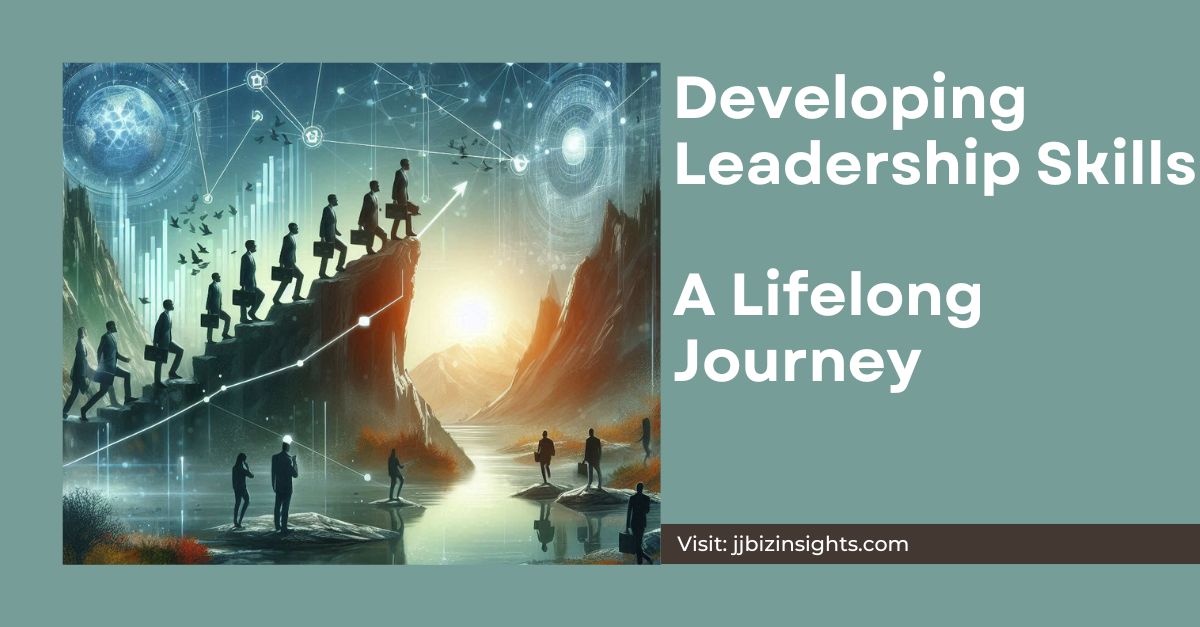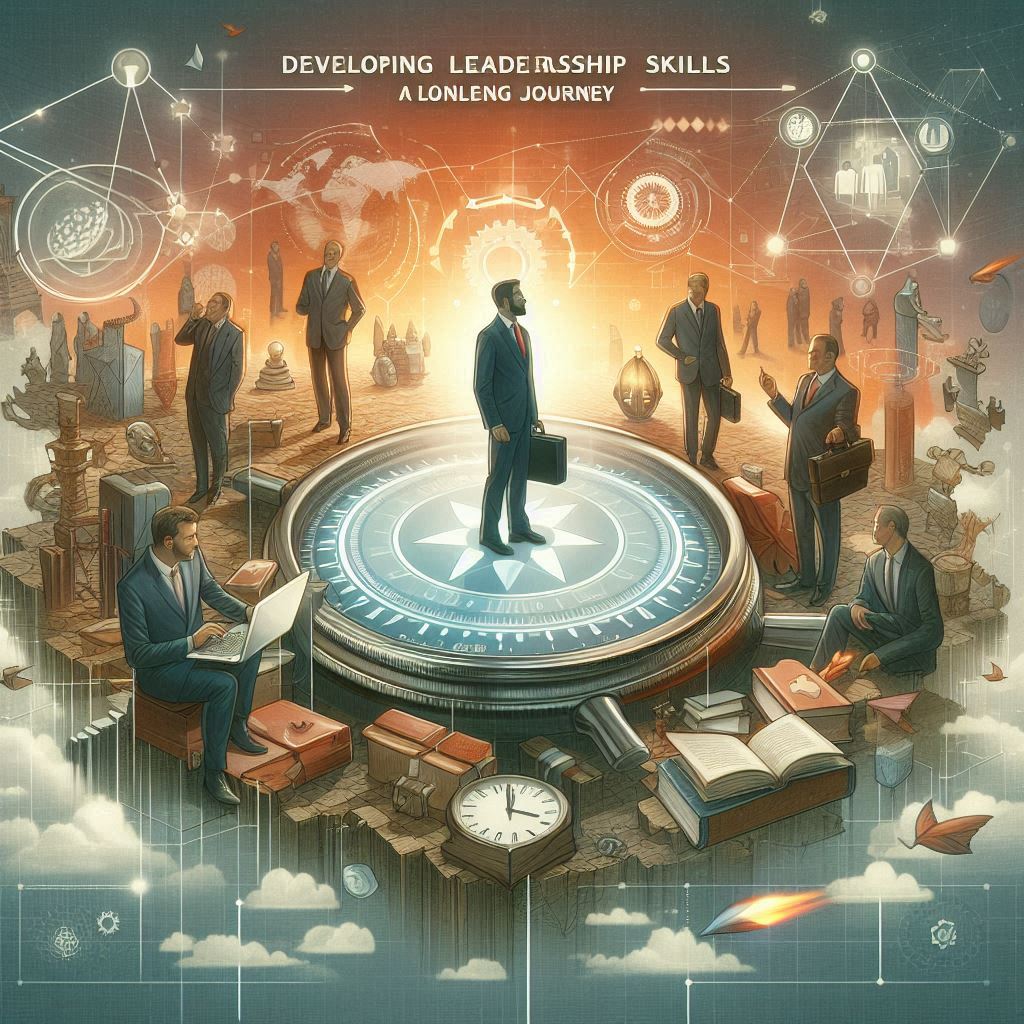
Developing Leadership Skills: A Lifelong Journey
Leadership is not a static role; it’s a dynamic process that demands continuous growth and adaptation. Effective leaders understand that their journey is one of lifelong learning and development. Let’s explore the key strategies for honing your leadership skills.
Self-Awareness: The Foundation of Leadership

Understanding oneself is the first step towards becoming a better leader. Self-awareness involves a deep introspection into your strengths, weaknesses, values, and motivations. It’s about recognizing your patterns of behavior, how you react to different situations, and the impact you have on others.
- Strengths-Based Leadership: Identify and leverage your core competencies. Understanding your strengths empowers you to delegate tasks effectively and focus on areas where you excel.
- Addressing Weaknesses: Acknowledging your weaknesses is not a sign of weakness but a testament to self-awareness. By identifying areas for improvement, you can develop strategies to overcome them or find ways to compensate.
- Values Alignment: Understanding your values helps you make decisions that align with your personal and organizational goals. It also guides your behavior and interactions with others.
Continuous Learning: Fueling Growth
The business world is constantly evolving, and successful leaders must keep pace with change. Continuous learning is essential for staying ahead of the curve and acquiring new skills and perspectives.
- Formal Education: Pursuing advanced degrees or certifications can enhance leadership knowledge and credibility.
- Workshops and Conferences: Attending industry events provides opportunities to learn from experts and network with peers.
- Online Courses and Webinars: Leverage digital platforms to access a wealth of leadership development resources.
- Mentorship and Coaching: Seeking guidance from experienced leaders can accelerate your growth.
The Power of Mentorship and Coaching
Mentorship and coaching are invaluable tools for leadership development. A mentor can offer guidance, support, and advice, while a coach can provide structured feedback and accountability.
- Seeking a Mentor: Identify a seasoned leader who shares your values and can provide valuable insights.
- Becoming a Mentor: Sharing your knowledge and experience with others can be equally rewarding.
- Coaching Others: Developing coaching skills enhances your ability to empower and develop team members.
The Importance of Feedback
Feedback is a powerful tool for growth. By actively seeking feedback from colleagues, subordinates, and superiors, you can gain valuable insights into your strengths and areas for improvement.
- Constructive Criticism: Embrace feedback as an opportunity for development.
- 360-Degree Feedback: Gather feedback from multiple sources to get a comprehensive view of your leadership style.
- Open Communication: Create a culture of open feedback within your team to foster continuous improvement.
The Role of Experience
Practical experience is invaluable in leadership development. Taking on challenging roles and responsibilities can accelerate your growth and build your confidence.
- Embracing Challenges: Step outside your comfort zone and seek opportunities to take on new responsibilities.
- Learning from Failures: View failures as learning experiences and opportunities for growth.
- Building Resilience: Develop the ability to bounce back from setbacks and persevere through challenges.
By prioritizing self-awareness, continuous learning, mentorship, feedback, and practical experience, leaders can cultivate the skills and qualities necessary to excel in their roles and inspire others. Remember, leadership is a journey, and the most effective leaders are those who are committed to lifelong learning and growth.
How to improve self-awareness?
Improving self-awareness is a valuable journey that can enhance your leadership skills and overall personal growth. Here are some effective strategies to help you become more self-aware:
1. Practice Mindfulness and Meditation
Engaging in mindfulness and meditation can help you become more aware of your thoughts, emotions, and reactions. These practices encourage you to observe your inner experiences without judgment, leading to greater self-understanding.
2. Keep a Journal
Writing regularly in a journal can help you reflect on your daily experiences, emotions, and behaviors. This practice can reveal patterns and insights about yourself that you might not notice otherwise.
3. Seek Feedback from Others
Ask for honest feedback from trusted friends, family members, or colleagues. They can provide valuable perspectives on your strengths and areas for improvement that you might not see yourself.
4. Identify Your Values
Understanding your core values can guide your decisions and actions. Reflect on what is truly important to you and how these values influence your behavior and interactions with others.
5. Engage in Self-Reflection
Set aside time regularly to reflect on your experiences and actions. Ask yourself questions like, “What did I do well today?” and “What could I have done better?” This can help you gain insights into your behavior and motivations.
6. Practice Gratitude
7. Read Fiction
8. Use Self-Assessment Tools
9. Meditate on Your Goals
Spend time thinking about your long-term goals and how they align with your values and strengths. This can help you stay focused and motivated.
10. Embrace Challenges and Learn from Failures
By incorporating these strategies into your routine, you can develop a deeper understanding of yourself and continuously improve your leadership abilities. Remember, self-awareness is a lifelong journey, and every step you take brings you closer to becoming a more effective and empathetic leader.
Some Common Blind Spots in Self-Awareness
Identifying blind spots in self-awareness is crucial for personal and professional growth. Here are some common blind spots that many people experience:
1. Going It Alone
2. Insensitivity to Others
3. “I Know” Attitude
Valuing being right over being effective can close you off to new ideas and feedback.
4. Avoiding Difficult Conversations
5. Blaming Others or Circumstances
Refusing to take responsibility and playing the victim can hinder your ability to learn from mistakes and grow1.
6. Overconfidence
7. Underestimating Impact
8. Ignoring Feedback
9. Perfectionism
10. Lack of Emotional Regulation
Strategies to Overcome Blind Spots
- Seek Regular Feedback: Actively ask for feedback from colleagues, friends, and family to gain different perspectives.
- Reflect on Experiences: Take time to reflect on your actions and their outcomes to identify patterns and areas for improvement.
- Engage in Self-Assessment: Use tools and assessments to gain insights into your personality, strengths, and weaknesses.
- Practice Mindfulness: Mindfulness practices can help you become more aware of your thoughts and emotions in the moment.
- Embrace Continuous Learning: Stay open to learning and adapting by seeking new experiences and knowledge.
By addressing these blind spots, you can enhance your self-awareness and become a more effective and empathetic leader.
More About Emotional Regulation
Emotional regulation is the ability to manage and respond to your emotional experiences in a healthy and productive way. It’s a crucial skill for maintaining mental well-being and effective interpersonal relationships. Here are some key aspects of emotional regulation:
What is Emotional Regulation?
Emotional regulation involves the processes by which individuals influence their emotions, how they experience them, and how they express them. This can be automatic or controlled, conscious or unconscious, and it can affect various points in the emotion-producing process1.
Key Skills for Emotional Regulation
- Mindfulness: Being present in the moment and aware of your thoughts and feelings without judgment can help you manage your emotions more effectively.
- Cognitive Reappraisal: This involves changing the way you think about a situation to alter its emotional impact. For example, viewing a challenging situation as an opportunity for growth rather than a threat.
- Emotional Awareness: Recognizing and understanding your emotions is the first step in managing them. This includes identifying what you are feeling and why.
- Impulse Control: Learning to pause before reacting to strong emotions can prevent impulsive actions that you might later regret.
- Self-Compassion: Treating yourself with kindness and understanding during difficult times can help you manage negative emotions more effectively.
- Stress Management: Techniques such as deep breathing, exercise, and relaxation can help reduce the intensity of emotional responses.
Why is Emotional Regulation Important?
Effective emotional regulation can help you:
- Maintain Composure: Stay calm and composed during challenging situations
- Improve Relationships: Better manage your reactions and communicate more effectively with others.
- Enhance Decision-Making: Make more rational and less emotionally-driven decisions.
- Reduce Stress: Lower your overall stress levels by managing your emotional responses.
Strategies to Improve Emotional Regulation
- Practice Mindfulness and Meditation: These practices can help you become more aware of your emotions and how to manage them.
- Seek Feedback: Ask for feedback from trusted individuals to gain insights into how your emotions affect your behavior.
- Engage in Self-Reflection: Regularly reflect on your emotional experiences and how you handled them.
- Develop Healthy Coping Mechanisms: Find activities that help you manage stress and emotions, such as exercise, hobbies, or talking to a friend.
By developing these skills and strategies, you can enhance your ability to regulate your emotions, leading to better mental health and more effective leadership.
Cultivating Powerful Leadership: A Comprehensive Guide





